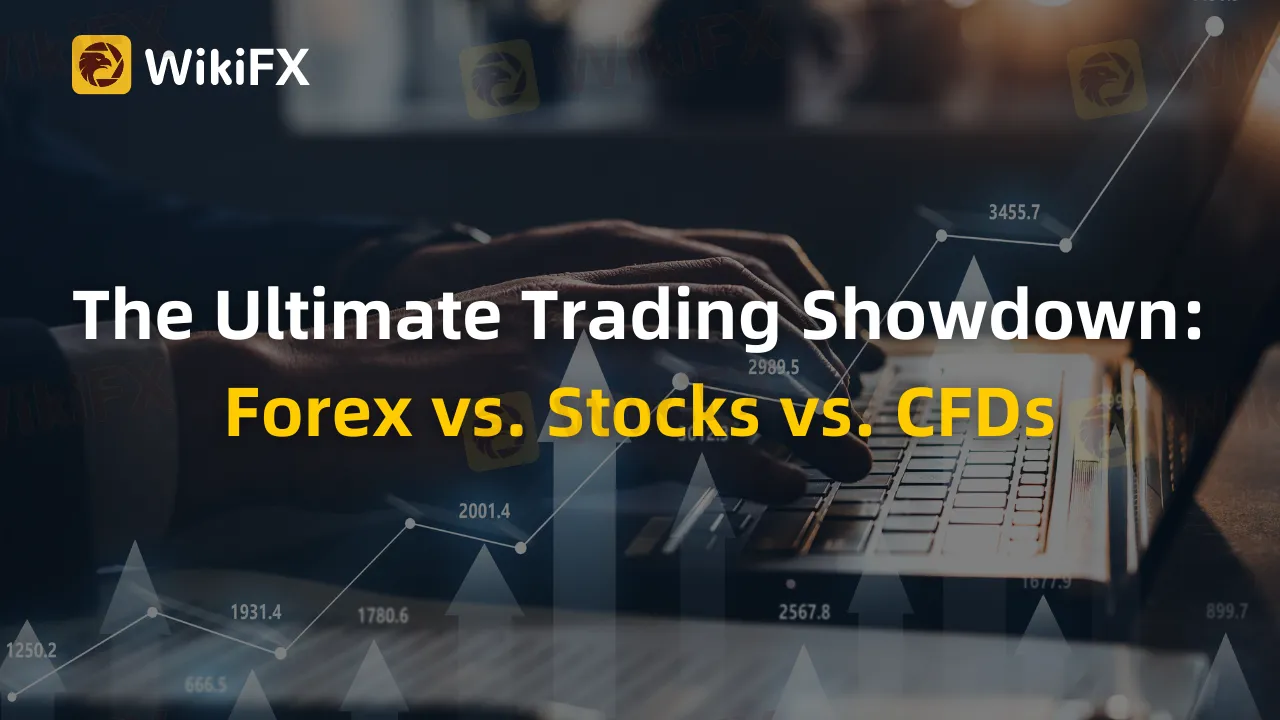Abstract:Forex, stocks, and CFDs each offer unique profitability potential. Forex boasts high liquidity and flexible trading hours, stocks provide long-term growth and dividends, while CFDs offer diverse market opportunities. The most profitable instrument depends on individual preferences, goals, and risk tolerance.

Each of these tools has distinctive qualities of its own and, when used with the appropriate techniques, may provide significant profits. We'll talk about the profitability potential of forex, stocks, and CFDs in this post to help you decide which one could be the most profitable for your trading career.
Forex: The Foreign Exchange Market
With a daily trading volume of over $6 trillion, the foreign exchange market, often known as FX, is the biggest and most liquid financial market in the world. Investors that engage in forex trading purchase and sell currencies in pairs in an effort to benefit from changes in exchange prices.

Pros of Forex Trading:
Liquidity: The massive trading volume in forex ensures that transactions can be executed quickly, with minimal slippage.
Market Hours: The forex market operates 24 hours a day, five days a week, offering flexibility to trade at any time.
Leverage: Forex brokers typically offer high leverage, enabling traders to control large positions with relatively small amounts of capital.
Low Costs: Due to the absence of central exchanges, forex trading costs are generally lower than those associated with stocks and CFDs.
Cons of Forex Trading:
Leverage Risk: The use of high leverage can amplify both profits and losses, making forex trading riskier for inexperienced traders.
Volatility: Unexpected news events, geopolitical tensions, and economic data releases can cause sudden and significant fluctuations in currency values.
Stocks: Investing in Companies
Purchasing and selling stock includes doing business with publicly listed corporations. Profiting from rising share prices and, sometimes, dividends, is the goal. Exchanges like the NASDAQ and the New York Stock Exchange (NYSE) are where stocks are exchanged.

Pros of Stock Trading:
Ownership: Stock traders become partial owners of the companies they invest in, granting them voting rights and potential dividends.
Long-term Growth: Historically, stocks have offered higher returns than other asset classes over the long term.
Diversification: With thousands of stocks available, traders can diversify their portfolios across different industries, reducing risk.
Cons of Stock Trading:
Market Hours: Stock markets have limited trading hours, which can restrict trading opportunities for those with busy schedules.
Costs: Stock trading generally involves higher costs, such as brokerage fees and taxes.
Market Volatility: Stocks can be subject to sharp price fluctuations due to factors like earnings reports, changes in economic conditions, and investor sentiment.
CFDs: Contracts for Difference
Without holding the underlying asset, traders may speculate on the price changes of many financial instruments, including stocks, indices, commodities, and cryptocurrencies, using a Contract for Difference (CFD), a kind of derivative contract. With just a tiny portion of the entire position value required as a down payment, CFDs are traded on leverage.

Pros of CFD Trading:
Flexibility: CFDs allow traders to profit from both rising and falling markets, enabling them to capitalize on diverse market conditions.
Leverage: Similar to forex, CFD trading offers high leverage, increasing the potential for larger profits or losses.
Diversification: CFDs cover a wide range of financial instruments, providing ample opportunities for portfolio diversification.
Cons of CFD Trading:
Counterparty Risk: When trading CFDs, traders are essentially entering into a contract with their broker, exposing them to counterparty risk if the broker defaults.
Costs: CFD trading may involve higher costs, such as overnight financing charges, spreads, and commissions. 3. Regulatory Restrictions: CFD trading is banned or restricted in some countries, limiting its accessibility for some traders.
Comparing Profitability: Forex, Stocks, and CFDs
It is not easy to determine which of these products is the most lucrative since the answer relies on a number of variables, including a trader's trading style, risk tolerance, and financial objectives. However, we can examine a few crucial elements to help shed light on their likelihood of being profitable.
Liquidity: Forex offers the highest liquidity among the three instruments, ensuring swift trade execution and minimizing slippage. Stocks and CFDs can also offer substantial liquidity, but this varies depending on the specific asset being traded.
Leverage: Both forex and CFD trading provide a high leverage, which can amplify profits as well as losses. While stocks typically offer lower leverage, their long-term growth potential can still yield substantial profits.
Market Hours: Forex has the advantage of operating 24 hours a day, five days a week, enabling traders to capitalize on opportunities at any time. Stock markets have more limited trading hours, while CFDs follow the trading hours of their underlying assets.
Costs: Forex trading generally involves lower costs compared to stocks and CFDs, which can improve overall profitability. However, the costs of trading CFDs can still be competitive, depending on the broker and specific financial instruments being traded.
Diversification: Both stocks and CFDs offer a wide range of assets to trade, allowing for better diversification of trading portfolios. Forex trading, while highly liquid, is limited to currency pairs.
Conclusion
While it's challenging to definitively declare one instrument as the most profitable, each of forex, stocks, and CFDs has unique advantages that can be leveraged for potential profits. Unlike any other market, forex has unmatched liquidity and flexible trading times, while stocks have the potential for long-term development and the ability to earn dividends. CFDs, on the other hand, provide traders the opportunity to profit from a variety of market circumstances and provide a wide selection of underlying assets to trade.
The best trading tool for you will ultimately rely on your own tastes, trading objectives, and risk tolerance. It's essential to properly investigate and comprehend each instrument, as well as to create a solid trading plan that supports your goals. You'll be more prepared to negotiate the trading market and improve your chances of success if you do this.
Download and install the WikiFX App on your smartphone to stay updated on the latest news.
Download the App here: https://social1.onelink.me/QgET/px2b7i8n













